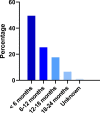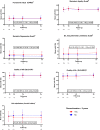Discontinuation of adjuvant endocrine therapy and impact on quality of life and functional status in older patients with breast cancer
- PMID: 35441273
- PMCID: PMC9114046
- DOI: 10.1007/s10549-022-06583-7
Discontinuation of adjuvant endocrine therapy and impact on quality of life and functional status in older patients with breast cancer
Abstract
Purpose: Side effects are the main reason for discontinuation of adjuvant endocrine therapy in older adults. The aim of this study was to examine geriatric predictors of treatment discontinuation of adjuvant endocrine therapy within the first 2 years after initiation, and to study the association between early discontinuation and functional status and quality of life (QoL).
Methods: Patients aged ≥ 70 years with stage I-III breast cancer who received adjuvant endocrine therapy were included. The primary endpoint was discontinuation of endocrine therapy within 2 years. Risk factors for discontinuation were assessed using univariate logistic regression models. Linear mixed models were used to assess QoL and functional status over time.
Results: Overall, 258 patients were included, of whom 36% discontinued therapy within 2 years after initiation. No geriatric predictive factors for treatment discontinuation were found. Tumour stage was inversely associated with early discontinuation. Patients who discontinued had a worse breast cancer-specific QoL (b = - 4.37; 95% CI - 7.96 to - 0.78; p = 0.017) over the first 2 years, in particular on the future perspective subscale (b = - 11.10; 95% CI - 18.80 to - 3.40; p = 0.005), which did not recover after discontinuation. Treatment discontinuation was not associated with functional improvement.
Conclusion: A large proportion of older patients discontinue adjuvant endocrine treatment within 2 years after initiation, but geriatric characteristics are not predictive of early discontinuation of treatment. Discontinuation of adjuvant endocrine therapy did not positively affect QoL and functional status, which implies that the observed poorer QoL in this group is probably not caused by adverse effects of endocrine therapy.
Keywords: Breast cancer; Endocrine therapy; Geriatric assessment; Older patients.
© 2022. The Author(s).
Conflict of interest statement
The authors have no relevant financial or non-financial interest to disclose.
Figures



References
-
- DeSantis CE, Ma J, Gaudet MM, Newman LA, Miller KD, Goding Sauer A, et al. Breast cancer statistics, 2019. CA. 2019;69(6):438–451. - PubMed
-
- Biganzoli L, Battisti NML, Wildiers H, McCartney A, Colloca G, Kunkler IH, et al. Updated recommendations regarding the management of older patients with breast cancer: a joint paper from the European Society of Breast Cancer Specialists (EUSOMA) and the International Society of Geriatric Oncology (SIOG) Lancet Oncol. 2021 doi: 10.1016/S1470-2045(20)30741-5. - DOI - PubMed
-
- de Glas N, Bastiaannet E, de Boer A, Siesling S, Liefers GJ, Portielje J. Improved survival of older patients with advanced breast cancer due to an increase in systemic treatments: a population-based study. Breast Cancer Res Treat. 2019;178(1):141–149. doi: 10.1007/s10549-019-05356-z. - DOI - PMC - PubMed
MeSH terms
Substances
LinkOut - more resources
Full Text Sources
Medical

